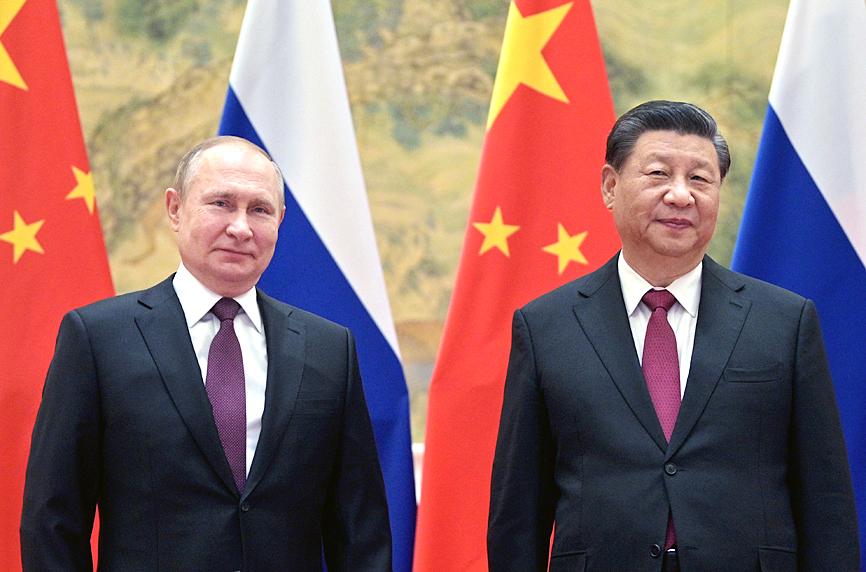Chinese President Xi Jinping (習近平) had his first face-to-face meeting with a world leader in nearly two years yesterday as he hosted Russian President Vladimir Putin, with the pair drawing closer as tensions grow with the West.
Xi has not left China since January 2020, when the country was grappling with its initial COVID-19 outbreak and locked down the central city of Wuhan, where the virus was first detected.
He is now readying to meet more than 20 leaders as Beijing begins a Winter Olympics that could be a soft-power triumph and shift focus from a buildup blighted by a diplomatic boycott and fears of COVID-19.

Photo: AP
Xi and Putin met in the Chinese capital before commenting on their shared views regarding security and other issues, a Kremlin adviser said at a media briefing on Wednesday.
The two leaders were then to attend the Olympics opening ceremony yesterday evening.
Spiraling tensions with the West have bolstered ties between the world’s largest nation and its most populous, and Putin was the first foreign leader to confirm his plans to attend the ceremony.
He hailed Russia’s “model” relations with Beijing phone call with Xi in December last year, calling his Chinese counterpart a “dear friend.”
China’s state-run Xinhua news agency on Thursday carried an article from Putin in which the Russian leader painted a portrait of two neighbors with increasingly shared global goals.
“Foreign policy coordination between Russia and China is based on close and coinciding approaches to solving global and regional issues,” Putin wrote.
He also criticized US-led Western diplomatic boycotts of the Beijing Olympics that were sparked by China’s human rights record.
“Sadly, attempts by a number of countries to politicize sports for their selfish interests have recently intensified,” Putin wrote, calling such moves “fundamentally wrong.”
China has become more vocal in backing Russia in its dispute with NATO powers over Ukraine.
Last week, Chinese Minister of Foreign Affairs Wang Yi (王毅) called Russia’s security concerns “legitimate,” saying they should be “taken seriously and addressed.”
Moscow is looking for support after its deployment of 100,000 troops near its border with Ukraine prompted Western nations to warn of an invasion and threaten “severe consequences” in response to any Russian attack.
China enjoyed plentiful support from the Soviet Union — the precursor to the modern Russian state — after the establishment of Communist rule in 1949, but the two socialist powers later fell out over ideological differences.
Good relations resumed as the Cold War ended in the 1990s, and the countries have pursued a strategic partnership in the past decade that has seen them work closely on trade, military and geopolitical issues.
The bonds have strengthened during Xi’s administration, at a time when Russia and China are increasingly at odds with Western powers.
Other leaders scheduled to enjoy Xi’s hospitality during the Games include Egyptian President Abdel Fattah al-Sisi, Saudi Arabian Crown Prince Mohammed bin Salman, Kazakh President Kassym-Jomart Tokayev and Polish President Andrzej Duda.
About 21 world leaders are expected to attend the Games.
A majority of those leaders rule over non-democratic regimes, according to the Economist Intelligence Unit’s Democracy Index, with 12 labeled either “authoritarian” or a “hybrid regime.”

South Korea would soon no longer be one of the few countries where Google Maps does not work properly, after its security-conscious government reversed a two-decade stance to approve the export of high-precision map data to overseas servers. The approval was made “on the condition that strict security requirements are met,” the South Korean Ministry of Land, Infrastructure and Transport said. Those conditions include blurring military and other sensitive security-related facilities, as well as restricting longitude and latitude coordinates for South Korean territory on products such as Google Maps and Google Earth, it said. The decision is expected to hurt Naver and Kakao

MONEY GRAB: People were rushing to collect bills scattered on the ground after the plane transporting money crashed, which an official said hindered rescue efforts A cargo plane carrying money on Friday crashed near Bolivia’s capital, damaging about a dozen vehicles on highway, scattering bills on the ground and leaving at least 15 people dead and others injured, an official said. Bolivian Minister of Defense Marcelo Salinas said the Hercules C-130 plane was transporting newly printed Bolivian currency when it “landed and veered off the runway” at an airport in El Alto, a city adjacent to La Paz, before ending up in a nearby field. Firefighters managed to put out the flames that engulfed the aircraft. Fire chief Pavel Tovar said at least 15 people died, but

THE TRAGEDY OF PUNCH: Footage of the seven-month-old Japanese macaque has gone viral online after he was rejected by his mother and formed a bond with a soft toy A baby monkey in Japan has captured hearts around the world after videos of him being bullied by other monkeys and rejected by his mother went viral last week. Punch, a Japanese macaque, was born in July last year at Ichikawa City Zoo. He has drawn international attention after zookeepers gave him a stuffed orangutan toy after he was abandoned by his mother. Without maternal guidance to help him integrate, Punch has turned to the toy for comfort. He has been filmed multiple times being dragged and chased by older Japanese macaques inside the enclosure. Early clips showed him wandering alone with

Australian Prime Minister Anthony Albanese yesterday said he did not take his security for granted, after he was evacuated from his residence for several hours following a bomb threat sent to a Chinese dance group. Albanese was evacuated from his Canberra residence late on Tuesday following the threat, and returned a few hours later after nothing suspicious was found. The bomb scare was among several e-mails threatening Albanese sent to a representative of Shen Yun, a classical Chinese dance troupe banned in China that is due to perform in Australia this month, a spokesperson for the group said in a statement. The e-mail